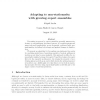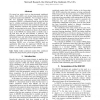278 search results - page 14 / 56 » Anticipation Model for Sequential Learning of Complex Sequen... |
CORR
2011
Springer
13 years 4 months ago
2011
Springer
Forecasting sequences by expert ensembles generally assumes stationary or near-stationary processes; however, in complex systems and many real-world applications, we are frequentl...
SPIN
2012
Springer
11 years 11 months ago
2012
Springer
Since counterexamples generated by model checking tools are only symptoms of faults in the model, a significant amount of manual work is required in order to locate the fault that...
INTERSPEECH
2010
13 years 3 months ago
2010
We extend our earlier work on deep-structured conditional random field (DCRF) and develop deep-structured hidden conditional random field (DHCRF). We investigate the use of this n...
COR
2008
13 years 9 months ago
2008
Operations research and management science are often confronted with sequential decision making problems with large state spaces. Standard methods that are used for solving such c...
ICML
2000
IEEE
14 years 10 months ago
2000
IEEE
Hidden Markov models (HMMs) are a powerful probabilistic tool for modeling sequential data, and have been applied with success to many text-related tasks, such as part-of-speech t...


